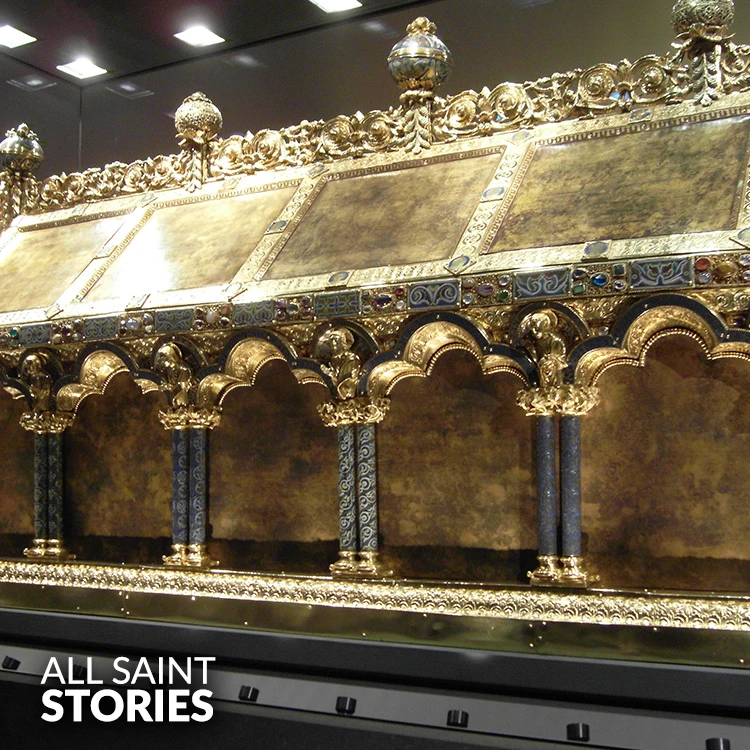"Saint Anno II, humble servant of God, intercede for us with your prayers. Guide us in our struggles, strengthen our faith, and help us live with compassion and wisdom. May your example of piety and devotion inspire us to follow Christ more closely. Amen."
ST. ANNO II
ST. ANNO II

St. Anno II was a powerful and influential Archbishop of Cologne in the 11th century. Renowned for his administrative reforms and deep spirituality, he played a key role in imperial politics and the Church’s mission during a turbulent era. Founder of Siegburg Abbey and a promoter of monastic life, he was canonized in 1183 for his piety and leadership.
Saint Anno II, born around 1010 in what is now Germany, rose to prominence as one of the most significant ecclesiastical and political figures of the 11th century in the Holy Roman Empire. Appointed Archbishop of Cologne in 1056, Anno played a central role in both Church and state, serving not only as a spiritual leader but also as an imperial regent and political strategist during a particularly complex era of European history.
Anno came from a noble Swabian family, and he received his early education in Bamberg and later in the cathedral school of Bamberg or Fulda. His piety and intellect attracted attention, and he was eventually appointed to ecclesiastical office. In 1056, Emperor Henry III nominated him as Archbishop of Cologne, one of the most prestigious and politically powerful sees in the Empire.
When Emperor Henry III died shortly after Anno's appointment, leaving his young son Henry IV as heir, Anno became one of the regents of the Empire. He took part in what is known as the "Coup of Kaiserswerth" in 1062, where he and a group of other nobles effectively took custody of the boy emperor in an attempt to wrest control from his mother, Empress Agnes. Though criticized by some for the bold move, Anno’s intentions were seen as protective of both the empire and the Church.
As archbishop, Anno was both a reformer and a builder. He worked diligently to restore discipline among the clergy and introduced monastic reforms aligned with the ideals of the Cluniac movement, emphasizing prayer, discipline, and learning. One of his most enduring legacies is the founding of the Benedictine Abbey of Siegburg in 1064, which became a vital center for reform and spirituality in the region.
Anno was also a patron of the arts and architecture. He encouraged the construction and renovation of churches and religious houses, which reflected the growing spiritual and cultural dynamism of the Rhineland under his leadership. Under his episcopate, Cologne became an influential center of Christianity in Europe.
Though politically involved, Anno consistently tried to act according to his conscience and spiritual convictions. His leadership was often marked by a deep concern for the poor and for justice, and he sought to resolve disputes both within the Church and between secular rulers with fairness. His reforming zeal placed him in occasional conflict with both secular authorities and members of the clergy, but his efforts bore fruit in stronger institutions and renewed spiritual fervor.
Anno died on December 4, 1075. His body was buried in the abbey he founded at Siegburg. Veneration for him began soon after his death, and his tomb became a place of pilgrimage. Reports of miracles contributed to his growing reputation for sanctity, and in 1183, Pope Lucius III formally canonized Anno, recognizing his piety, service, and leadership.
In the broader scope of Church history, St. Anno II represents the ideal of the bishop-statesman—a man who, while deeply immersed in the politics of his time, never lost sight of his role as a shepherd of souls. He managed to balance reform, political responsibility, and spiritual leadership in a way that few others in his position achieved during the era.
Video Not Found
The information on this website is compiled from various trusted sources. While we aim for accuracy, some details may be incomplete or contain discrepancies.
If you notice any errors or have additional information about this saint, please use the form on the left to share your suggestions. Your input helps us improve and maintain reliable content for everyone.
All submissions are reviewed carefully, and your personal details will remain confidential. Thank you for contributing to the accuracy and value of this resource.
Credits & Acknowledgments
- Anudina Visudhar (Malayalam) – Life of Saints for Everyday
by Msgr. Thomas Moothedan, M.A., D.D. - Saint Companions for Each Day
by A. J. M. Mausolfe & J. K. Mausolfe - US Catholic (Faith in Real Life) – Informational articles
- Wikipedia – General reference content and images
- Anastpaul.com – Saint images and reflections
- Pravachaka Sabdam (Malayalam) – Saint-related content and insights
We sincerely thank these authors and platforms for their valuable contributions. If we have unintentionally missed any attribution, please notify us, and we will make the correction promptly.
If you have any suggestion about ST. ANNO II
Your suggestion will help improve the information about this saint. Your details will not be disclosed anywhere.
© 2026 Copyright @ www.allsaintstories.com





 English
English
 Italian
Italian
 French
French
 Spanish
Spanish
 Malayalam
Malayalam
 Russian
Russian
 Korean
Korean
 Sinhala
Sinhala
 Japanese
Japanese
 Arabic
Arabic
 Portuguese
Portuguese
 Bantu
Bantu
 Greek
Greek
 German
German
 Dutch
Dutch
 Filipino
Filipino